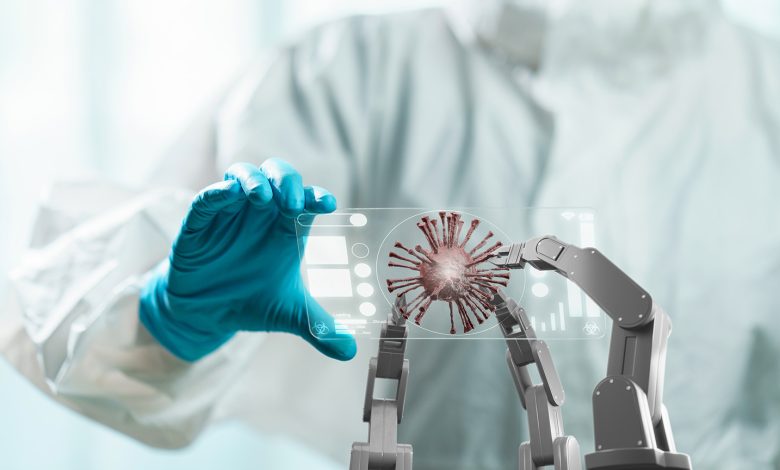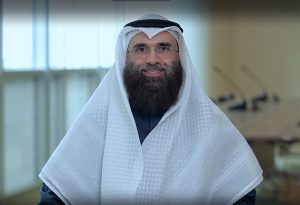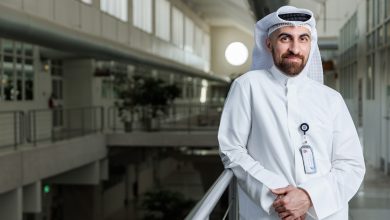Improving Patient Outcomes with Computer Science
Abdullah Almutawa, an expert in artificial intelligence and machine learning, is changing how disease are detected and treated

Abdullah Almutawa is one of Kuwait’s foremost experts on artificial intelligence and machine learning, and he uses his skills to help people in the medical field. Almutawa earned a doctorate in Computer Artificial Intelligence from Syracuse University in Syracuse, New York, in 1999. Following graduation, he joined the Computer Engineering Department at Kuwait University, where he still serves as an associate professor. Almutawa is also a recognized expert in artificial intelligence and ethics and recently served on an intergovernmental committee that drafted recommendations on the ethics of artificial intelligence adopted by the United Nations Educational, Scientific, and Cultural Organization (UNESCO) in November 2021.
“Artificial intelligence is a broad subject,” Almutawa said. While it might sound complicated, artificial intelligence actually has a simple premise. “What we do is try to imitate the intelligent behavior of any species,” he said. “Humans are at the top of the pyramid.” While organic species, like humans, develop natural intelligence, machines can develop artificial intelligence. Almutawa is also a specialist in machine learning, a branch of artificial intelligence that uses data and algorithms to train machines.
Usually, humans learn from examples, and machine learning imitates this process. Specialists like Almutawa feed machines thousands of good and bad examples. At first, the researchers tell the machine which examples are good or bad. Eventually, it “learns” how to do that itself. As the machine sees more and more examples, its performance improves.
These methods can be applied in dozens of fields, from retail to agriculture. Almutawa has made a career using his knowledge of artificial intelligence and machine learning in the medical field.
A Career of Helping People
Working in medicine has allowed Almutawa to combine his skills and interests with his desire to help people, which he said has been a goal since the beginning of his career. One of the first papers he published early in his career involved using artificial intelligence and expert systems to help patients with hearing loss. One of Almutawa’s more recent projects involved developing a system that used electroencephalograph (EEG) signals to help hospitalized patients on ventilators express themselves. “This [auto-emotion detection] will detect if they are bored, happy, sad, disgusted or frustrated,” said Almutawa, “because it is reading the signals directly from their brain.”

One of Almutawa’s latest projects involves using these computer engineering skills and technologies with the application to the medical field to analyze COVID-19 cases admitted to Kuwait hospitals. The study will help to identify and protect high-risk patients at the earliest stages of the disease.
Applying AI and Machine Learning to COVID-19
Beginning in 2020, Almutawa led a team of researchers who used machine learning methods to analyze COVID-19 patients’ genome sequences, medical histories, and outcomes. “From our observations, the same family could have one member hospitalized in the intensive care unit, and others are not,” said Almutawa, “We would like to benefit from this information.” By analyzing data from cases like these, the research team set out to determine why some patients have more severe cases of COVID-19 than others. The team received support from the Kuwait Foundation for the Advancement of Sciences (KFAS) to conduct their research.
They used two approaches: First, the team took sequenced data from COVID-19 patients held in an international repository and applied machine learning methods to re-analyze it. This approach produced some interesting findings regarding the origin of the coronavirus.
But Almutawa said the team’s most significant breakthroughs came from their second approach when they collected data from COVID-19 patients admitted to the intensive care unit at Jaber Hospital in Kuwait City. “We collected around four hundred patients that had been admitted to ICU unit and had their full medical history fed into our machine learning system,” he said.
The machine used information about these patients’ cases and medical histories to help the team develop categories. These categories could be used to sort future patients based on whether they are likely to have a critical case of COVID-19. With these categories, Almutawa said, “We can [make] critical decisions about if a patient would be admitted or be released further on.”
Almutawa said that the information could be used to develop an app or a website that people could visit after testing positive with COVID-19. The app would ask targeted questions about risk factors and your medical history. Then it would use that information to gauge whether a patient should be admitted to the hospital for early treatment or if they are likely to have a minor case without further intervention. If the system recognizes that a person is at high risk for a critical case, they could receive treatment immediately rather than wait for their symptoms to worsen.
This technology could save lives and protect hospitals from becoming overloaded with patients that are unlikely to become critical. According to Almutawa, the research team hopes their findings can be “part of the global solution to the pandemic,” and inspire new paths for further research at the intersection of computer science and medicine.
According to Almutawa, artificial intelligence and machine learning provide an excellent merging of the engineering, technical, and medical fields to help numerous people.
By Marianne Dhenin




